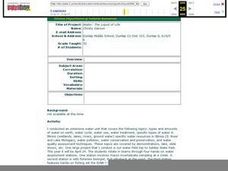Library of Congress
The Conservation Movement at a Crossroads: The Hetch Hetchy Controversy
Should wilderness areas be preserved or managed? Class members examine primary source documents, including lecture notes, articles, essays and congressional records to better understand the Hetch Hetchy controversy that created a split...
Curated OER
Water Awareness Portfolio Instructions
Students participate in a water awareness portfolio. In this water conservation lesson students create a portfolio to help make them aware of current water conditions.
Curated OER
Don't Let the Earth Down
Writing a persuasive argument starts with a clear thesis. Using this resource, your class will write a persuasive paper on a conservation issue. They will then transform their argument into a 30-second public service announcement. If...
Curated OER
Water: The Liquid of Life
Sixth graders complete a lesson on the properties, types and amounts of water on Earth. In groups, they travel between stations to identify water resources in Illinois and pollution sources. They complete the lesson with a field trip...
Curated OER
Cultivating Oklahoma's Future
In this Oklahoma agriculture lesson, 8th graders read and discuss information and vocabulary about new developments in agriculture. Students write essays on the future of agriculture in Oklahoma.
Curated OER
Writing a Political Leader
Students investigate politics by writing a formal letter. For this U.S. Government lesson, students discuss political issues they would like to address and research their topic using the Internet. Students locate an appropriate political...
Curated OER
A Reef of Your Own
Students research and study the life and reproductive strategies of reef building corals. They examine how coral reefs can produce high levels of biological material when they are surviving in areas of low nutrition.








